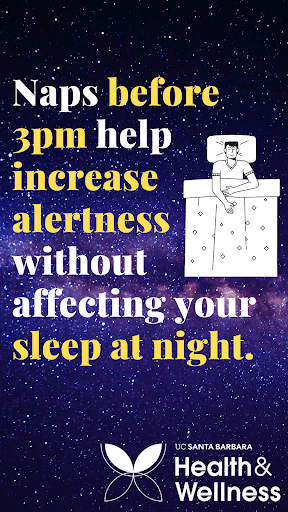
Feeling sleepy in the afternoon is human nature. Everyone naturally experiences dips in energy levels due to two systems, biological hormones and the circadian rhythm (our “internal clock”). These dips occur when we need them most, the largest being during the hours of midnight and dawn, and a second smaller dip between around 1 p.m. and 3 p.m.. The post-lunch dip can be quite frustrating during afternoon lectures but, as a student, it is important to recognize and acknowledge the signs your body is giving you. Sometimes the best choice for your health is to take a break and take a nap.

Let's say you have a 3 hour gap in between classes, then you may have the opportunity to take a 90- 120 minute nap. A well timed, 90-120 minute nap allows you to complete one entire sleep cycle. This includes sleeping through the lightest stage to the deepest stage of sleep and back again. If you have enough time to complete the cycle, you can allow your nap to go longer (past 20 minutes to a full 90-120 minutes) and not feel groggy upon waking.
Many cultures have napping deeply integrated into their daily lifestyles. Take for example the siesta, which is observed throughout the world including regions of South America and Mediterranean Europe. “The word siesta is a Spanish term that comes from the Latin phrase “hora sexta” or “the sixth hour” indicating a midday rest six hours after awakening.” Many countries take this nap time seriously, shutting down businesses for several hours in the afternoon, which allows for crucial rest during the hottest part of the day.
However, with the busy pace of life now baked into modern society, some countries are finding it difficult to schedule this break time, which has shown to have health consequences. A team of researchers from Harvard University's School of Public Health decided to quantify these repercussions through a study of 23,000 Greek citizens, ages 20-83 years old over a six year period. All participants initially exhibited signs of perfect cardiovascular health. “However, those who abandoned regular siestas went on to suffer a 37% increased risk of death from heart disease across the six-year period, relative to those who maintained regular daytime naps.” In comparison, there are a few Greek islands where this nap culture remains strong and studies from the island of Ikaria show “men are nearly four times as likely to reach the age of ninety as American males.”
Health & Wellness Nap Tips: When you nap, you decrease the sleep debt that you have accumulated throughout the day. This is VERY helpful if you slept less than your optimal amount the prior night. Naps are also a great pick me up in the midday dip! Depending on your bedtime, try to wrap up your nap around 3-4 pm so that your body can build up enough sleep pressure to induce drowsiness and desire to sleep in the evening. If you are consistently taking naps and unable to fall asleep or stay asleep for a full night of rest (i.e. experiencing insomnia) it is recommended that you work with a healthcare provider to help you get your sleep back on track. Longer naps later in the afternoon can impair your nighttime sleep and hinder the establishment of a regular routine which is essential for consistent, good sleep.
Don’t forget:
· Short afternoon naps can improve alertness for up to 2-3 hours
· Promoting sufficient sleep supports your goals of academic success
Ficca, G., Axelsson, J., Muto, V., Vitiello, M.V. (2009). Naps, cognition, and performance. Sleep Medicine Reviews, 14, 249-258.
National Sleep Foundation. (2020, August 14). Debunking Sleep Myths: Does Napping During the Day Affect Your Sleep at Night?. Retrieved September 2020, from www.sleepfoundation.org/articles/debunking-sleep-myths-does-napping-during-day-affect-your-sleep-night.
Walker, M. (2017). Chapter 4: Ape Beds, Dinosaurs, and Napping with Half a Brain: Who Sleeps, How Do We Sleep, and How Much? Why we sleep: Unlocking the power of sleep and dreams.(pp. 55-76). Simon and Schuster.
Whittington, Z. (2012). The Benefits of Napping - Sleeping Strategically to Increase Your Energy, Memory, and Intelligence. End Your Sleep Deprivation. Retrieved July 2020, from http://www.end-your-sleep-deprivation.com/benefits-of-napping.html

This work is licensed under a Creative Commons Attribution 4.0 International License.